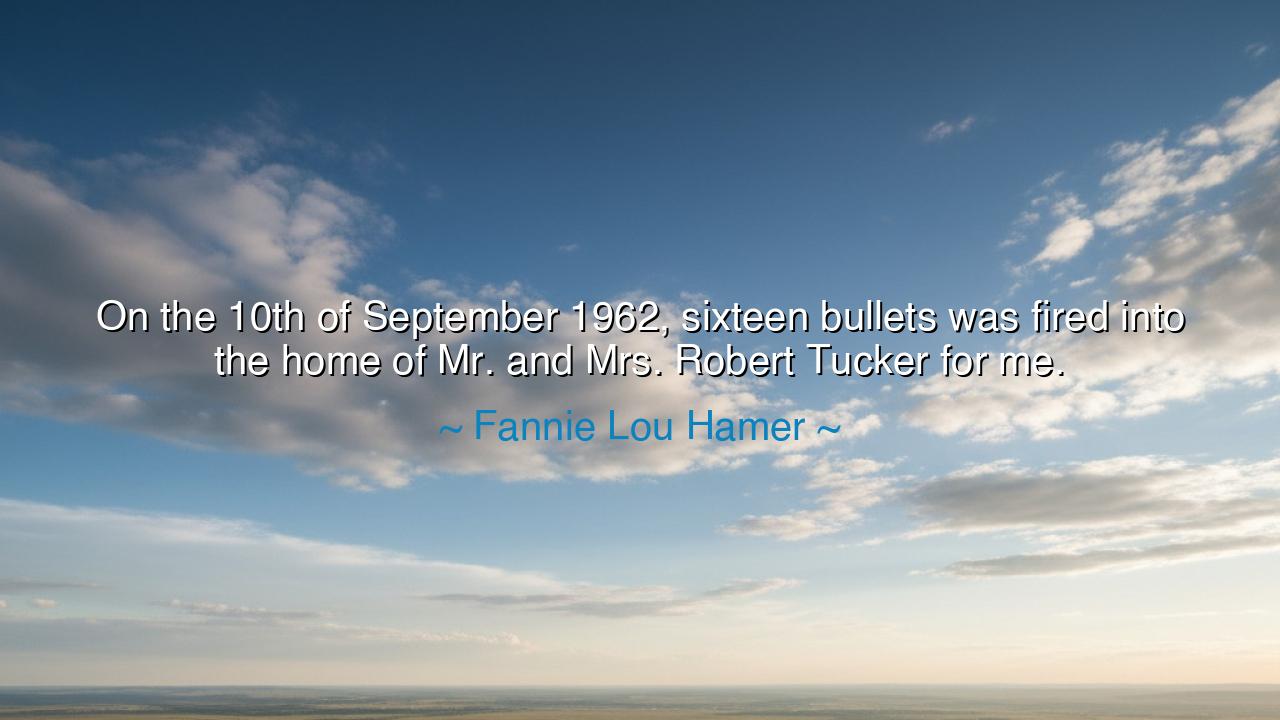
On the 10th of September 1962, sixteen bullets was fired into the
On the 10th of September 1962, sixteen bullets was fired into the home of Mr. and Mrs. Robert Tucker for me.






In the words of Fannie Lou Hamer, “On the 10th of September 1962, sixteen bullets was fired into the home of Mr. and Mrs. Robert Tucker for me.” — there burns a truth that pierces through time like a flame that will not die. Her words are not spoken for pity, nor for fear, but for remembrance — a testimony of courage born in an age of terror, when to seek justice was to risk one’s very life. Beneath her steady voice lies the heartbeat of a people who chose to stand, even when standing meant facing the gun. In this single sentence, the weight of an entire struggle is carried: the struggle of those who dared to claim their dignity in a world that denied it.
Fannie Lou Hamer, born in Mississippi in 1917, was not a scholar, nor a soldier in the formal sense — but she was both sage and warrior in spirit. She rose from the fields of sharecropping, where she had spent much of her life under the crushing hand of poverty, to become one of the fiercest voices of the Civil Rights Movement. Her weapon was not the rifle nor the knife, but truth — truth spoken so clearly and fiercely that it shook the conscience of a nation. When she registered to vote, she became a marked woman; her very act of claiming a right promised by law was seen as rebellion. And so it was that on that night, in 1962, sixteen bullets tore through a home — not because of what she had done, but because of what she represented: freedom itself.
The ancients would have recognized her as one of their own — a woman of unyielding spirit, who faced persecution not as a victim, but as a vessel of divine purpose. Like Socrates who drank the hemlock rather than betray truth, like Joan of Arc who faced the fire with prayer on her lips, Hamer bore her suffering not with despair, but with resolve. For in her understanding, the bullets that shattered glass and walls could not break the soul. “They fired sixteen bullets for me,” she says — not “at me,” but for me. In this choice of words lies something extraordinary: she transforms violence into testimony, hatred into meaning. The bullets, meant to silence, instead became witnesses — proof of the cost of courage, and the price of justice.
To the ancient ear, her story would sound like that of a martyr of principle, one whose pain was not hers alone, but the burden of her people. The Tuckers, whose home was attacked, took that burden too — ordinary people standing in extraordinary times. Their house became a battleground not between armies, but between the forces of fear and the power of conviction. And yet, as Hamer recounted the story in years to come, there was no bitterness in her voice, only clarity. She understood that every struggle for truth must pass through the fire, that the tree of freedom, as the ancients would say, must draw strength from the storm.
Consider, for a moment, the image of sixteen bullets — not as weapons, but as symbols of a world trembling before change. In every age, the entrenched powers fear those who awaken the conscience of others. The Roman Empire feared the Christians; monarchs feared the philosophers of democracy; tyrants feared the poets who sang of liberty. So too did the architects of segregation fear Hamer, for she was not merely one woman — she was the awakening of a people, a voice that could not be bought, bent, or broken. The bullets that flew that night were aimed at silencing a movement, but instead they echoed across generations, strengthening the resolve of those who would continue the march.
Her words remind us that freedom is never free, that progress is written not only in ink, but in suffering. The ancients knew this law of the universe: that every noble ideal demands sacrifice. But Hamer’s genius was to meet that reality not with despair, but with faith — a belief that love and justice are stronger than fear and hate. She did not flee the struggle; she became its song. “I’m sick and tired,” she once said, “of being sick and tired.” Yet even in that exhaustion, she refused to surrender. The ancient heroes fought for thrones; Hamer fought for the soul of humanity itself.
And so, what lesson shall we draw from her words? It is this: that courage is not the absence of fear, but the mastery of it. That to live for truth is to invite opposition, but to endure it is to build legacy. We must not turn away from injustice simply because it is dangerous or uncomfortable; rather, we must, like Hamer, face it with steadfast heart. Her story teaches that one voice — one soul that refuses to bow — can awaken the conscience of a nation. The fire of righteousness, once lit, cannot be extinguished, no matter how many bullets are fired against it.
Let us, then, carry her memory not as a wound, but as a torch. For as Fannie Lou Hamer herself proved, the bullets of hatred may strike walls, but they cannot pierce truth. The voice that speaks for justice becomes immortal — an echo across time, calling all generations to rise, to act, to believe in the sacred worth of every human being. Thus, her words are not a lament of fear, but a triumph of spirit — a testament that even in the face of violence, truth stands, unbroken, eternal, and free.






AAdministratorAdministrator
Welcome, honored guests. Please leave a comment, we will respond soon